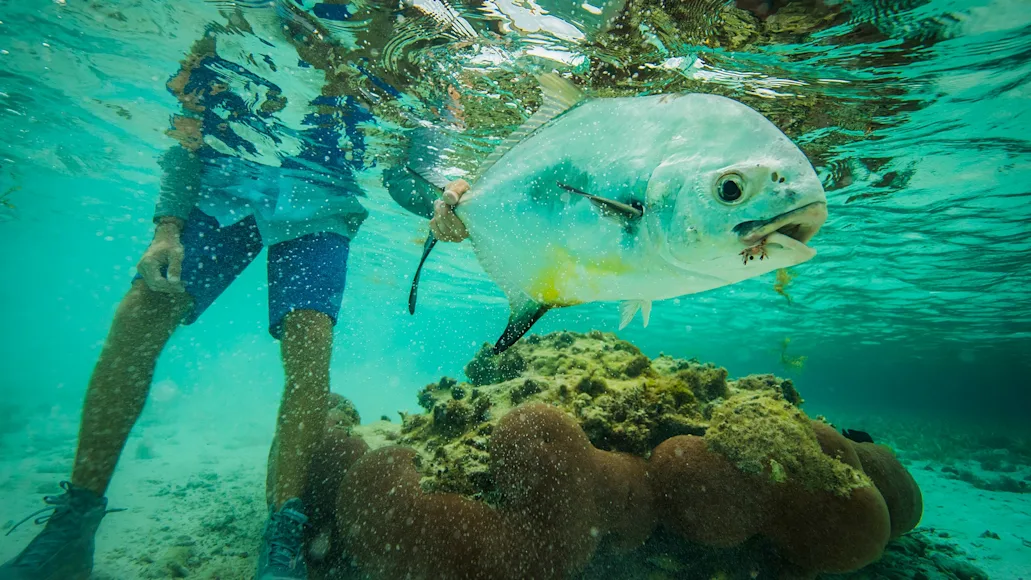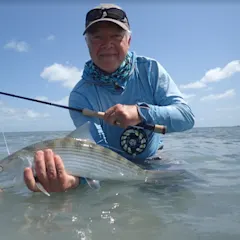“YOU GO,” I said.
“You sure?” Jack asked. My son knows I don’t like giving up the casting deck of a flats boat.
“Go, go,” I replied. “You want a permit worse than I do. But hurry up before I change my mind.”
And there wasn’t time to waste. Two permit were already ahead of the boat, and our Belizean guide was frantically working the pushpole, trying to keep up. One fish was too far away, so Jack split the difference and cast a crab fly toward the blue gap between the sickle-finned fish.
Nice, I said to myself, as Jack twitched the crab right across the permit’s face. But one thing all permit anglers know about these fish is that you just never know. This one wasn’t buying—and that was the only shot Jack would get. It was a disappointment, but we had a more pressing conundrum to work through: Who’s turn was it to fish now?
The challenge when fly fishing from a poled flats skiff is that typically only one angler can fish at a time—and as much as Jack and I have fished together, we haven’t figured out the switch quite yet. Do we change positions after every shot at a sighted fish? After every landed fish? At the top of the hour? Back in the day, when I wanted Jack to catch fish much more than I wanted to catch them myself, this was a less complicated equation. But those days didn’t last long. They ran out about the time Jack turned 8. In the years since, I’ve tried my best to maintain a position of parental charity, but it has been winnowed away by a passion for shooting and catching stuff that surprises me to this day. I reckon I’m just selfish.
Growing Pains
By most measures, I’m supposed to be better than this by now. More evolved. More mature. But in the place of that missing dose of grown-up-ness there’s a kind of honesty with myself that I do feel good about: I know precisely where I am on the growth chart of sportsmanship.
Many of us are aware of the Five Stages of the Sportsman, but in case you’re not, here is a refresher:
Stage 1: As a beginner hunter or angler, you want to shoot and catch everything.
Stage 2: Here, it’s all about shooting or catching a limit.
Stage 3: You want to hunt only the most mature animals, or fish for the largest trout or bass.
Stage 4: You start to make things more difficult—and rewarding—by trying more challenging methods such as bowhunting or fly fishing.
Stage 5: This is the mentor period, in which you are more interested in passing along your skills and knowledge than in shooting or catching anything yourself.

The author grins with his first-ever permit. (Photo: T. Edward Nickens)
Over the past few years, I’ve been very clear with field companions, both young and old, about where I fit on this sporting spectrum: I’ve been stuck at about Stage 2.3 for going on 40 years, and there’s no indication that I’ll be moving up anytime soon. I like to shoot, and I like to catch, and if you get a crack at the ducks before I do, it’s only because I was digging in my pack for some jerky. Nowhere is this more evident than in a flats boat, where you’re forced to share like a kindergartner bringing candy to class.
Learner’s Permit
After his permit rejection, Jack bequeathed the casting deck to me. I wasn’t sure if it was charity, or a sense of fairness, or whether he just needed to sulk for a few minutes like most of us do when cut down to size by a fish whose Latin name, Trachinotus falcatus, means “armed with scythes.”
Jack didn’t have long to stew. The boat was running full throttle when he suddenly yelled, “Permit! Permit! Three right there!” The guide circled the boat widely, then poled quietly to cut the distance. The fish were lazily finning, undisturbed. I suppose I could have handed the rod to Jack. He’d spotted the fish; he needed a pick-me-up. It would have been the fatherly thing to do. Looking back, I don’t recall that the thought ever crossed my mind.
My first cast was long, and I held my breath as the fish swam over the leader, nearly invisible in the turtle grass. But my second fell miraculously spot-on, and while the lead fish didn’t want to play, the second fish in line turned to follow the fly. I stripped with my heart pounding. Like Jack, every previous cast I’d made to permit had been summarily rejected. When the fish suddenly twitched—and accelerated—and the fly disappeared, I could hardly believe my luck.
The rod bowed and the stacked fly line at my feet sprang through the rod guides. With the fish on the reel, Jack and I whooped with a sense of victory. It wasn’t a large permit, but it was my first.
When I brought the fish to the side of the boat, Jack was, as he nearly always is, gracious. “Dad!” he said, pounding me on the back. “Your first permit! I’m so glad I was here to see it!”
It was an unselfish display of affection—all the more noteworthy given his disappointment at his missed chance to connect with a permit an hour earlier. And I must admit: For the first time in a long time, I felt the needle on my sporting spectrum begin to quiver. Jack seemed to have leapfrogged me by a few stages—how this happened and when it happened is a mystery. It’s possible that my focus on performance blinds me, at times, to other ways in which a day on the water can be measured. It’s possible that I lose sight of how my intensity might affect my companions.
And it suggests that, after all these years, I have some growing up to do.






